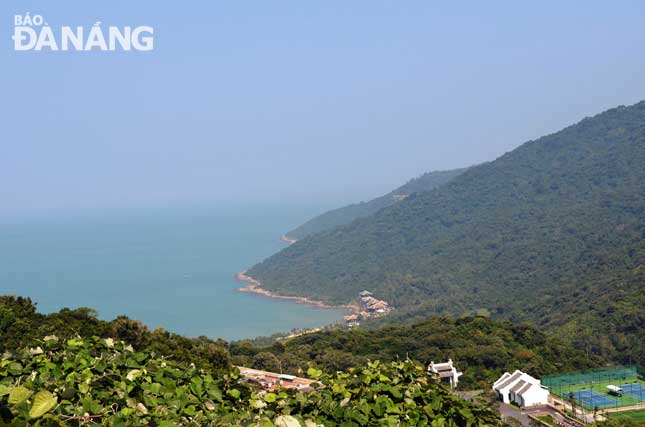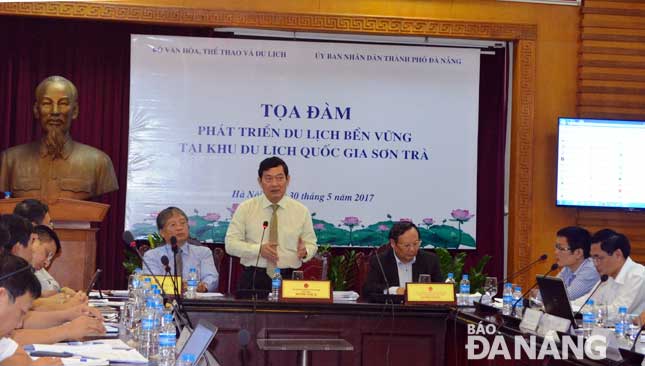Debate on tourism development plans for Son Tra Peninsula
On Tuesday, a seminar entitled ‘Ensuring Sustainable Tourism Development in the National-level Son Tra Tourism Area’ took place in Ha Noi. The event was jointly organised by the Ministry of Culture, Sports and Tourism and the Da Nang People’s Committee (PC).
 |
| A view of the peninsula |
Late last year, the Prime Minister approved Da Nang’s master plan for developing the national-level Son Tra tourism area towards 2025 with a vision to 2030. In detail, the 1,056ha tourism area will be nestled on the Son Tra Peninsula in Son Tra District, about 10km northeast of the inner city. The specific focus will be on developing the area to meet the requirements for a national-level tourism site by 2025. By 2030, special attention will have been paid to developing it into a luxury holiday and eco-tourism centre in the south central coastal region, as well as into an important destination on the national road and marine tourism routes. In particular, the aim was to have accommodation projects offering a total of 1,600 rooms by 2030.
However, there have been many differing public opinions expressed recently about this master plan.
Therefore, Deputy Minster for Culture, Sports and Tourism Huynh Vinh Ai remarked that the seminar was aiming to collect constructive ideas from domestic scientists and experts in a bid to give the public an objective insight into this project.
 |
| Deputy Minister Ai addressing the event |
At the seminar, Mr Huynh Tan Vinh, Chairman of the Da Nang Travel Association, suggested that the peninsula should be kept unchanged rather than constructing more accommodation establishments in future years. He explained that the whole city now has around 600 hotels offering a combined total of about 22,000 rooms. With such a large number of hotel rooms, the city is well able to ensure sufficient accommodation for up to 15 million visitors per year.
Chairman Vinh also highlighted the need to only develop the Son Tra Peninsula into a tourist attraction in line with conserving its natural landscape. An etiquette guide for tourists should be issued to remind them to behave appropriately at the site. He also proposed that the existing Son Tra Nature Reserve and the surrounding sea off the peninsula should be merged into an international-level biosphere reserve similar to Quang Nam Province’s Cu Lao Cham (Cham Islands) in a bid to protect terrestrial and aquatic ecosystems there.
Not fully concurring with Chairman Vinh’s opinion, many experts at the seminar highlighted the importance of fully tapping the peninsula’s great tourism development potential through the effective implementation of tourism projects, rather than keeping it unchanged. Mr Nguyen Tan Van, Chairman of the Viet Nam Association of Architects, remarked that the imposition of a ban on future tourism projects on the peninsula is an unreasonable measure. However, he noted that effective measures should be taken to avoid the excessive exploitation of natural resources there. In a similar vein, Mr Vu The Binh, the Vice Chairman of the Viet Nam Tourism Association, noted that importance should be attached to carefully considering and approving the deployment of projects in suitable locations on the peninsula. Special heed should be paid to re-checking all the projects there, and temporarily suspending the implementation of any projects which are found to be violating the national construction regulations.
Meanwhile, a representative from the Da Nang PC highlighted the importance of developing the national-level son Tra tourism area in combination with appropriately tapping the peninsula’s natural resources. Top priority should be given to developing a spiritual tourism area, as well as a high-end ecological, sports and holiday area for visitors from both home and abroad. He also noted that the construction of 1,600 rooms by 2030, as was planned, is totally ‘suitable’. In particular, the national government should issue special mechanisms for the peninsula to ensure a harmony between promoting tourism development, guaranteeing security and defence, and conserving the peninsula.
In his closing speech at the seminar, Deputy Minister Ai said that the Ministry of Culture, Sports and Tourism will organise another seminar in Da Nang very soon to collect more constructive opinions from experts about the master plan.



